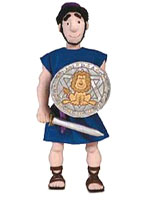Scroll down for the English
חַג חֲנוּכָּה שָׂמַח לְכוּלָּם!
לִכְבוֹד חַג הַחֲנוּכָּה נְבָרֵר - מִי הֵם המקבים? וּמָה הֶקְשֵׁר בֵּינָם וּבֵין קְבוּצַת הַסְּפּוֹרְט שֶׁל מַכַּבִּי?
הַכֹּל הִתְחִיל בְּזֶה שֶׁמַתִּתְיָהוּ הַזָּקֵן, אֲבִי הַמִּשְׁפָּחָה הָחָשְׁמוֹנָאִית, מִינָּה אֶת יְהוּדָה, שֶׁלֹּא הָיָה הַבֵּן הַבְּכוֹר, לִמְפַקֵּד הַמֶּרֶד. הוּא בָּחַר בּוֹ מִפְּנֵי שֶׁהָיָה מַצְבִּיא דָּגוּל, וְעַל כֵּן דָּבַק בּוֹ הַכִּינּוּי "מַקַבִּי", שֶׁזֶּה "פַּטִּישׁ"- בִּגְלַל שֶׁהָיָה "כְּמוֹ פַּטִּישׁ עַל רָאשִׁי אוֹיְבָיו". וְיֵשׁ עוֹד אֶפְשָׁרוּת, שֶׁהָרוֹמַאִים שִׁינּוּ אֶת שְׁמוֹ מֵ"יְהוּדָה הַמַּצְבִּיא" לִ"יהוּדָה הָמַקַבִּי"- כִּי הָרוֹמַאִים הֶחֱלִיפוּ אֶת הָאוֹת צ' בִּ ק'.
לְפִי יוֹסֵף בֵּן מַתִּתְיָהוּ, מַשְׁמָעוּת הַשָּׂם "מַכַּבִּי" הִיא רָאשֵׁי תֵּיבוֹת שֶׁל הַפָּסוּק "מִי כָּמוֹךָ בָּאֵלִים י'".
בְּמֶשֶׁךְ הַשָּׁנִים, חַג הַחֲנוּכָּה יָרַד מִגְּדוּלָּתוֹ. פָּחוֹת וּפָחוֹת יְהוּדִים חָגְגוּ אֶת הַחַג. בַּתְּפוּצוֹת הוּא כְּבָר כִּמְעַט נֶעֱלַם, אַךְ לְפֶתַע קָרוּ שְׁנֵי דְּבָרִים- אֶחָד הוּא הָפִיכָת חַג הַמּוּלָד לְחַג כְּבַד מִשְׁקָל בַּתַּרְבּוּת הָאַמֶרִיקָאִית, וּבִגְלַל זֶה הַיְּהוּדִים הָאַמֶרִיקָאִים שָׂמְחוּ לְאַמֵּץ אֶת חַג הַחֲנוּכָּה כְּחַג מַקְבִּיל (מִכָּאן גַּם הַמִּנְהָג הָאַמֶרִיקָאִי לָתֵת מַתָּנוֹת בְּעַרְבֵי חַג הַחֲנוּכָּה) וְהַשֵּׁנִי- הֲקָמַת מְדִינַת יִשְׂרָאֵל וּבִיסּוּס מִיתוֹס הַיְהוּדִי הַלּוֹחֵם. בִּגְלַל שֶׁיְּהוּדָה הַמַּכַּבִּי וּצְבָאוֹ הָפְכוּ לְסֵמֶל הַגְּבוּרָה הַיְהוּדִי, שֶׁבְּאֵיזֶשֶׁהוּ מָקוֹם סִימְּלוּ אֶת צָבְאָה הַקָּטָן שֶׁל מְדִינַת יִשְׂרָאֵל הַצְּעִירָה אֶל מוּל צְבָאוֹת עָרַב- הַשֵּׁם "מַּכַּבִּי" קָנָה לוֹ מָקוֹם שֶׁל כָּבוֹד בַּתַּרְבּוּת הַיְהוּדִית- קוּפָּ"ח מַּכַּבִּי, קְבוּצוֹת הַסְּפּוֹרְט שֶׁל מַּכַּבִּי וְעוֹד.
אַגַּב, לָאִידֵאוֹלוֹגְיוֹת וּלְמִיתוֹסִים שֶׁהִתְבָּסֵסוּ בִּתְקוּפַת הֲקָמַת הַמְּדִינָה יֵשׁ זֵכֶר עַד הַיּוֹם בִּשְׁמוֹתֵיהֶם שֶׁל גּוּפִּים גְּדוֹלִים בְּיִשְׂרָאֵל, כְּמוֹ בַּנְק הַפּוֹעֲלִים, קְבוּצוֹת הַסְּפּוֹרְט שֶׁל הַפּוֹעַל, בֵּיתָר וְעוֹד.
שֶׁיִּהְיֶה לְכוּלָּם חַג חֲנוּכָּה מֵאִיר וְשָׂמַח,
אסנת.
Happy Channukah to you all!
In honor of Channukah we are going to clarify just who were the Maccabeas and what is the
connection between them and the sports team- Maccabi.
Everything begins from Mattityahu the elder, the patriarch of the Hasmonean dynasty who appointed Yehuda, his eldest son, to be the head of the rebellion. He was chosen because he was an outstanding military commander and therefore they gave him the nickname "Maccabi" which is another word for "hammer" because he was "akin to a hammer on the head of the enemy". There is also an additional option as to why he received this nickname; the Romans changed his name from יְהוּדָה הַמַּצְבִּיא (Yehuda the military commander) to יהוּדָה הָמָקַבִּי (Yehuda
the Maccabi) because the Romans changed the letter "צ" to "ק".
According to Yosef Ben Matityahu the significance of the name Maccabi " מְכַבֵּי" is an acronym for the phrase ""מִי כָּמוֹךָ בְּאַלִּים י' ; "Who is like you oh L-rd our G-d. "
During the years, the festival of Chanukkah has lessened in its magnitude; fewer and fewer Jews celebrate the festival. In the Diaspora Channukah would have almost disappeared but for two things- the first being the weighting that Christmas has now in American culture. It is because of this that American Jews are happy to embrace Channukah as a festive parallel (from here originates the custom of exchanging gifts on the nights of Channukah). The second reason comes from the establishment of the state of Israel on the basis of Jewish myths and warriors. Yehuda the Maccabi and his army became a symbol of the might of the Jews that in some place symbolized the small army of the young state of Israel versus the might of the Arab armies. The name "Maccabi" thus found itself in an honored place in Jewsih culture- Kupat Holim Macabbi, Maccabi sports teams and more.
Additionally, the ideologies and myths upon which the state of Israel was founded have lent their names to the major bodies in Israel such as Bank Hapoalim, Hapoel and Beitar sports teams and more.
May you all have a light and happy Channukah,
Osnat




